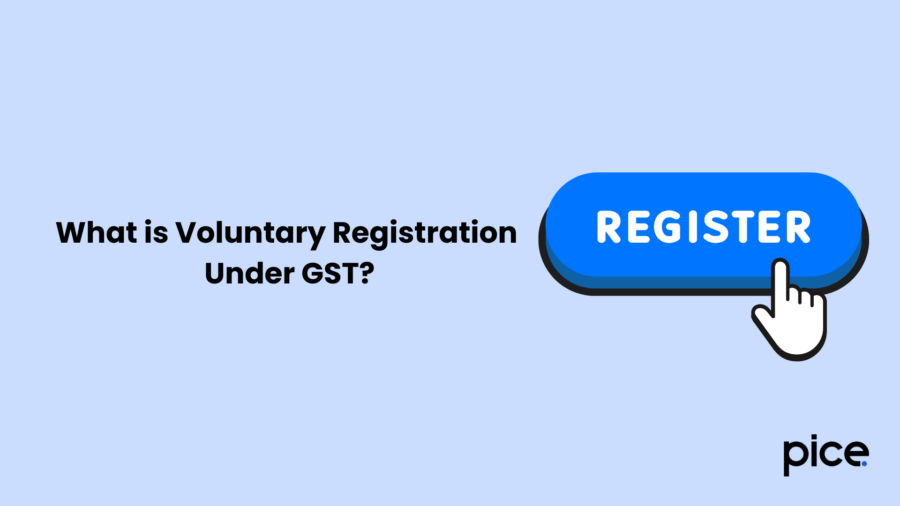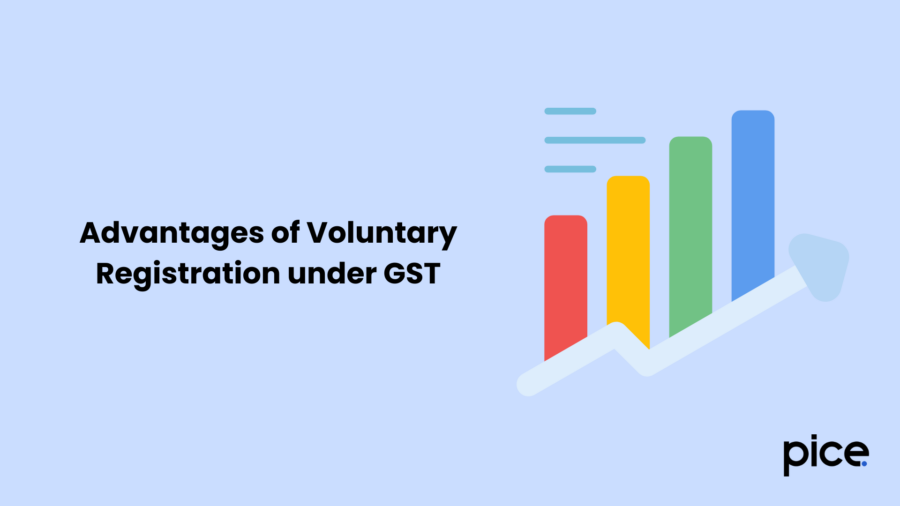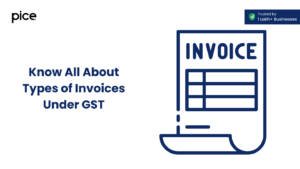Voluntary Registration Under GST: A Comprehensive Guide
- 10 Apr 25
- 9 mins

Voluntary Registration Under GST: A Comprehensive Guide
Key Takeaways
- Voluntary GST registration allows businesses below the turnover threshold to gain legal status and credibility.
- It provides access to input tax credit (ITC), facilitating better cash flow and operational efficiency.
- GST-registered businesses can engage in inter-state sales and e-commerce with fewer restrictions.
- Despite the benefits, voluntary registration increases compliance obligations, including regular tax filings and assessments.
- Voluntary registration can be cancelled after a year, offering flexibility for small businesses post cost-benefit evaluation.
An entity may opt for voluntary registration under GST even when it is not under any compulsion to register. Mandatory registration is not a requirement. The provisions of GST that apply to a registered taxable person shall also apply to the entity that voluntarily registers. They will be treated as a typical taxable person under the GST regime.
This blog will explore the meaning of voluntary registration under GST, what it entails, and other associated information.
What is Voluntary Registration Under GST?

Any business owner or taxable person that registers under GST at will even though they are not required to do so by law, indulges in voluntary registration under GST. The term "voluntary" indicates that registration under GST for certain categories of businesses/individuals is not mandatory, but is still an option.
Who is Eligible for Voluntary Registration?
Businesses which exceed the set requirement limit against annual revenue are to register for GST in India. These entities are mandated to register under GST:
- Businesses which engaged in interstate sales/supply
- Businesses which have an annual turnover of over ₹20 lakhs and ₹10 lakhs for special category states
- Businesses which sell goods/services through the medium of e-commerce platforms
Legally, it is not compulsory for businesses with an annual revenue of less than ₹20 lakhs (₹10 lakhs in the case of special category status states) to register for GST in India. However, such small businesses still have the option to voluntarily register under the GST regime.
Alternatively, businesses with a threshold limit turnover between ₹50 - ₹75 lakh may also select a composition levy scheme under the GST framework.
However, it is important to note that using the composition levy has several drawbacks, like the inability to claim input tax credits or collect tax from consumers. As a solution, instead of registering as composition dealers under the elaborate tax system, SMEs choose to register themselves as ‘normal dealers’ under GST to claim ITCs and other benefits.
What are the Reasons for applying for Voluntary Registration Under GST?
Here are some of the reasons why certain businesses or individuals voluntarily choose to register themselves GST:
- Status of a Registered Dealer: The GST-registered business shall be issued a certificate of registration. This document, in turn, will serve as official documentation vouching for the business’s legal status. It can be crucial when more prominent companies or potential business partners are involved.
- A Competitive Advantage: Voluntarily registering under GST gives the business a competitive advantage over its rivals. This is because several multinational companies and thriving businesses prefer to engage only with GST-registered entities. So, the GST registration certificate holds excellent value in this regard.
- Promote Inter-State Sales: Voluntary GST registration allows businesses to offset interstate transactions. This will be advantageous for future development plans and the implementation of expansion strategies.
- Boost E-Commerce Sales: Businesses offering goods/services across e-commerce platforms may select voluntary GST registration. This eliminates the future requirement for compulsory registration.
- Use the Unutilised ITC: Businesses with unutilised input tax credits from the pre-existing tax regimes (including service tax, VAT, etc.) can carry them over ahead via voluntary registration under GST.
Advantages of Voluntary Registration under GST

Here are the various advantages associated with voluntary registration under GST in India:
- Claiming Input Tax Credit (ITC): ITC claim is a key advantage associated with voluntary GST registration. By registering under GST at will, the entity will be able to claim ITC for the GST paid on specific items bought. This will, in turn, boost the steady cash flow and profitability of the business entity.
- Conduct inter-state sales with limited restrictions: Businesses registered under GST may conduct inter-state sales conveniently. This will shake up the market for SMEs and give the entities an upper hand when it comes to expansion. They may also freely choose to sell their goods online through e-commerce platforms.
- Business Expansion & Scalability: Voluntary registration allows for business expansion by promoting participation in government tenders and interstate sales. This further prompts compliance and scalability. Future registration obstructions are also successfully avoided.
- Compliance & Reputation: A company can gain credibility by becoming GST registered as a dealer. This status is particularly valuable when interaction with other large-scale businesses or when entering into respectable contracts/partnerships is necessary. It promotes compliance with GST regulations against the backdrop of national tax laws and even supports high compliance-grade maintenance.
- Ancillary Benefits: A GST-registered enterprise shall have increased credibility when getting approved for necessary bank loans or securing rentals.
Disadvantages of Voluntary Registration under GST
Here are some disadvantages associated with Voluntary Registration under GST:
- Multiple Return Filings: Businesses registered under GST will start filing returns. There will be 3 quarterly returns, including the GSTR-1, GSTR-2, and GSTR-3. Such GST returns account for purchases, offline and online sales, and the total sum of tax liabilities after the deduction of Input Tax Credit (ITC). In the case of failure to file, will result in the buyers being denied the input credit and lead to the accumulation of late fees, penalties and interest. All of these will negatively impact the compliance ratings.
- Increased Tax Liability: After registration under GST, the supplier has to collect and deposit taxes with the concerned authorities. This raises purchasers' costs, putting unregistered dealers in a disadvantageous position. The scenario is starkly different from that of GST-registered dealers.
- Loss of Advantage: After registration, businesses must collect the GST amounts from their customer base. However, unregistered sellers can potentially attract more buyers by offering GST-free rates, which are naturally lower.
- Compliance Ratings with GST laws: Post GST registration, entities will be required to comply with all the stated provisions of the GST Acts/Rules/Notifications. This also includes issuing GST-compliant invoices and abiding by the reverse charge mechanism set aside for GST payments.
- Assessment & Penal Provisions: After being registered with GST, businesses are legally required to abide by the GST law's assessments/penalty provisions. If insufficient resources are available to the business in question, which would have otherwise allowed them to comply properly, the complicated scenario can evolve into a grave problem. It shall result in the accumulation of interest/penalties for said business.
Is Voluntary Registration the Right Choice for You?

Here are the 2 questions that an individual considering voluntary registration under GST needs to answer before taking the essential steps:
- Who are their sellers/buyers?
- How many resources do they realistically have?
Further, here are the tips one can consider to make the most out of voluntary GST registration:
- Verify the suppliers’/customers’ registration status. This will boost awareness regarding whether or not certain sellers are registered and if the buyers are eligible to claim Input Tax Credit (to hold up the ITC chain).
- It would be better not to register if the end buyers are not registered.
- One can use the composition scheme to expand their business. Fewer taxes have to be paid, and fewer compliances are required. However, registering shall allow one to obtain bank loans quickly.
- Small-scale businesses must conduct a cost-benefit analysis before ultimately (or not) opting for voluntary registration under GST.
Is Voluntary Registration Permanent?
Voluntary registration under GST is not permanent. So, a business or individual that has voluntarily registered under GST may later choose to cancel their registration (at least after one year).
But there is an exception. Say an individual has opted for voluntary GST registration but has not conducted business within 6 months, starting from the registration date. In that case, here is what will happen:
- The authorised officer will cancel the GST registration;
- Requested by the individual concerned or;
- An application will be submitted from the legal heirs in the unfortunate case of the person’s death.
Conclusion
To conclude, voluntary registration under GST extends several benefits, including improved compliance, boosted credibility, and enhanced business expansion opportunities. It even simplifies GST compliance, minimises penalties, and provides access to ITC.
Even though there are certain associated disadvantages, the GST framework continues to evolve. Voluntary registration is becoming a preferred route, especially for businesses seeking a competitive edge within their respective fields.
💡If you want to streamline your payment and make GST payments via credit or debit card or UPI, consider using the PICE App. Explore the PICE App today and take your business to new heights.
 By
By 

















